You're staring at a bag of these knobbly, vaguely potato-like things in your fridge, and you're wondering what on earth to do with them. They’re not exactly the kind of vegetable that gets invited to the dinner party, are they? Have you ever heard someone rave about a "Jerusalem artichoke salad" at a dinner party? (I mean, maybe you have - you're a bit of a culinary adventurer, aren't you? ??)
But let me tell you, Jerusalem Artichokes (or "sunchokes" as they're also known) are a real hidden gem. They've got this earthy, nutty flavour that's just begging to be explored. And trust me, with a little bit of creativity, they can be transformed into some seriously delicious dishes.
So, grab your apron, put on your favourite playlist, and get ready to embark on a culinary journey with me. I'm going to walk you through some of my favourite Jerusalem artichoke recipes, from simple side dishes to show-stopping mains. We'll even explore some more adventurous uses for these unique tubers.
(Part 1) A Bit of Background: Unmasking the Mystery
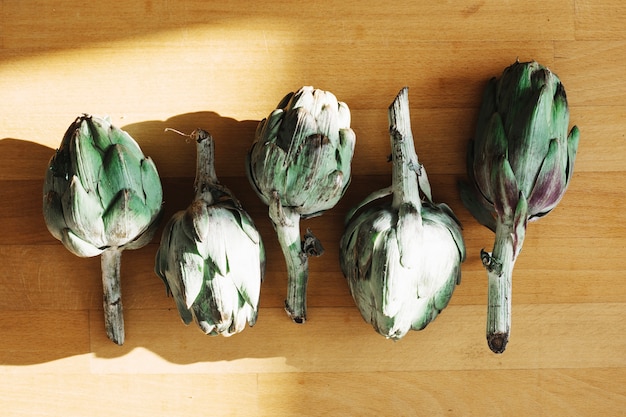
Okay, before we dive into the recipes, let's get a few things straight about these intriguing little tubers. Firstly, despite their name, they're not actually related to artichokes at all! They're a type of sunflower, and their name comes from a bit of a mix-up. The story goes that early settlers in North America thought they resembled the artichokes they'd left behind in Europe. They also thought they were from Jerusalem - who knows where that bit came from!
I love a good culinary mystery, don't you? It adds to the intrigue of trying something new. But let's get back to the facts. These little guys are packed with nutrients. They're a good source of fibre, potassium, iron, and vitamin C. Plus, they're naturally gluten-free, making them a great option for anyone with dietary restrictions.
But here's the thing about Jerusalem Artichokes that makes them a bit of a wildcard - they contain a type of sugar called inulin. Inulin is a prebiotic, which means it's good for your gut health. It helps to feed the good bacteria in your digestive system. But it can also give you, shall we say, a bit of a "gastrointestinal surprise" if you're not used to it. Don't worry, though! We'll talk about how to avoid that later.
How to Choose and Store Jerusalem Artichokes
You'll usually find Jerusalem Artichokes in the produce section of your local supermarket or farmers market. Look for tubers that are firm, smooth, and free of blemishes. Avoid any that are shriveled or have soft spots. These are signs they're not as fresh.
Store them in a cool, dark place, like your crisper drawer, for up to a week. You can also keep them in the freezer for longer storage. Just make sure to blanch them first (submerge them in boiling water for a few minutes, then plunge them into ice water), then freeze them in airtight bags or containers.
(Part 2) Simple Side Dishes: A Taste of the Unexpected
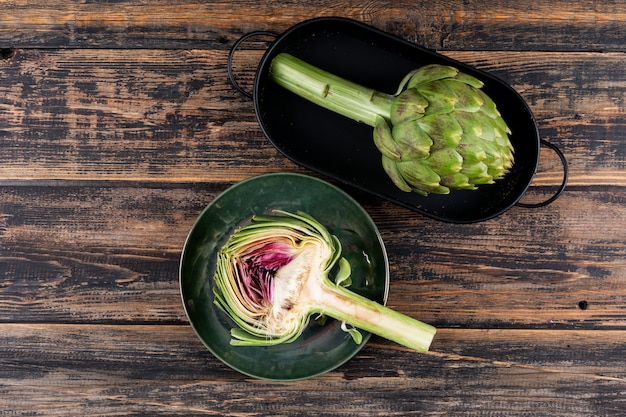
Right, let's get cooking! We'll start with some easy-peasy side dishes that will showcase the best of these delightful tubers.
1. Roasted Jerusalem Artichokes with Herbs and Garlic: A Classic with a Twist
This is my go-to side dish when I want something simple and flavourful. It's a great way to get that earthy, nutty flavour of the Jerusalem artichoke shining through. The roasting brings out a sweetness and depth that's just delicious.
- Preheat your oven to 200°C (400°F). This is a good temperature for getting a nice browning on the artichokes.
- Scrub the Jerusalem artichokes well and chop them into bite-sized pieces. You don't need to peel them - the skin is perfectly edible and adds a lovely texture. Plus, it's full of nutrients!
- Toss the chopped artichokes with olive oil, salt, pepper, garlic, and your favourite herbs. I love to use rosemary, thyme, and a bit of sage. They add a beautiful complexity of flavours to the dish.
- Spread the artichokes in a single layer on a baking sheet and roast for 20-25 minutes, or until they are tender and slightly browned. You want them to be cooked through but still have a bit of bite.
Serve these roasted beauties alongside grilled fish, chicken, or even a hearty vegetarian stew. They also go really well with roasted vegetables, like Brussels sprouts or carrots, for a complete meal.
2. Sautéed Jerusalem Artichokes with Lemon and Parmesan: A Bright and Zesty Side
For a quick and satisfying side dish, this sautéed recipe is a winner. It's light, bright, and bursting with flavour. The lemon adds a fresh acidity that cuts through the earthiness of the artichokes, while the Parmesan provides a creamy richness.
- Wash and slice the Jerusalem artichokes thinly. Thin slices cook more quickly and absorb the flavours better.
- Heat a generous amount of olive oil in a large skillet over medium heat. You want enough oil to coat the artichoke slices.
- Add the artichoke slices to the skillet and sauté for about 10 minutes, or until they are tender and lightly browned. You want them to be cooked through but still have a bit of a bite.
- Season with salt and pepper, then add a squeeze of lemon juice and a sprinkle of grated Parmesan cheese. The lemon juice brightens up the flavour, and the Parmesan adds a salty, nutty flavour.
- Stir well and serve immediately. The heat of the skillet will melt the cheese and give it a lovely gooey texture.
This dish is perfect alongside pasta, grilled meats, or roasted vegetables. It's also delicious served over a bed of greens for a lighter meal.
3. Creamy Jerusalem Artichoke Soup: A Comforting and Flavorful Treat
I love a good soup on a cold day, and this Jerusalem artichoke soup is a real crowd-pleaser. It's creamy, comforting, and full of flavour. The earthy flavour of the artichokes is balanced by the creaminess of the soup, making it a perfect winter warmer.
- Wash and chop the Jerusalem artichokes into small pieces. Smaller pieces cook faster and make it easier to blend the soup.
- Sauté some diced onion and garlic in olive oil until softened. This adds a base of sweetness and aroma to the soup.
- Add the chopped artichokes, some vegetable broth, and a pinch of salt and pepper to the pot. Use a good-quality broth for the best flavour.
- Bring the mixture to a boil, then reduce the heat and simmer for about 20 minutes, or until the artichokes are tender. This allows the flavours to meld together.
- Use an immersion blender to purée the soup until smooth. This gives it a velvety texture.
- Stir in a dollop of cream or yogurt and a sprinkle of fresh herbs, like parsley or chives, before serving. The cream or yogurt adds richness, and the herbs bring a touch of freshness.
This soup is fantastic on its own, but you can also add some crumbled bacon, toasted croutons, or a drizzle of truffle oil for an extra special touch. These toppings add a layer of texture and flavour complexity.
(Part 3) Adventures in Mains: Going Beyond the Side Dish
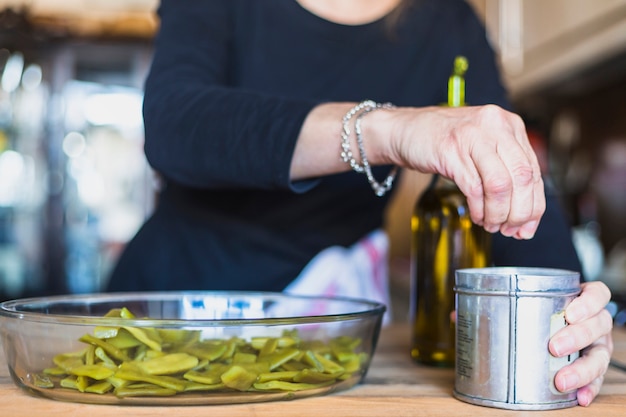
So, you're feeling a bit more adventurous, eh? Let's move on to some main courses that will really showcase the versatility of Jerusalem Artichokes.
4. Jerusalem Artichoke and Mushroom Gratin: A Showstopping Main Course
This gratin is a real showstopper. It's creamy, cheesy, and packed with flavour. It's perfect for a special occasion or a cosy family meal. The combination of artichokes, mushrooms, and cheese creates a symphony of textures and flavours.
- Preheat your oven to 180°C (350°F). This ensures the cheese melts and the gratin cooks evenly.
- Slice the Jerusalem artichokes and sauté them with some chopped mushrooms in olive oil until they are lightly browned. This brings out the sweetness of the artichokes and adds a delicious earthiness from the mushrooms.
- Spread the artichoke and mushroom mixture in a baking dish. Use a shallow baking dish for a nice, even gratin.
- Pour over a mixture of béchamel sauce (or a simple white sauce) and grated cheese. The béchamel adds creaminess, while the cheese provides a gooey, melty topping.
- Bake for about 20 minutes, or until the cheese is melted and bubbly. You want the cheese to be golden brown and slightly crusty.
Serve this gratin with a green salad or some roasted vegetables for a balanced meal. This creates a beautiful contrast of textures and flavours.
5. Jerusalem Artichoke and chickpea curry: A Spicy and Savoury Adventure
This curry is a flavour explosion! It's packed with spices, chickpeas, and creamy coconut milk. It's a great vegetarian option, and it's also perfect for serving alongside rice or naan bread. The artichokes add a unique texture and earthy flavour to the curry.
- Chop the Jerusalem artichokes into small pieces. This helps them cook quickly and absorb the flavours of the curry.
- Sauté chopped onions, garlic, and ginger in a large pot with some oil until fragrant. This creates the base of the curry and adds depth of flavour.
- Add curry powder, turmeric, cumin, coriander, and chili powder (adjust the spice level to your liking) and cook for a few minutes, stirring constantly. This releases the aromas of the spices and creates the delicious curry base.
- Add the chopped artichokes, chickpeas, and some vegetable broth to the pot. The broth helps to create a sauce for the curry.
- Bring to a simmer and cook for about 15 minutes, or until the artichokes are tender. This allows the artichokes to absorb the flavours of the curry.
- Stir in some coconut milk and chopped fresh cilantro before serving. The coconut milk adds creaminess and richness, while the cilantro brings a fresh, herbaceous note.
This curry is best served with rice or naan bread. You can also add some chopped spinach or kale to the curry for extra nutrients. These greens provide a nice contrast of colour and texture.
6. Jerusalem Artichoke and Walnut Salad: A Light and Refreshing Option
This salad is a delightful mix of textures and flavours. It's light and refreshing, and it's perfect for a summer lunch or dinner. The combination of roasted artichokes, walnuts, and goat cheese creates a delicious balance of sweet, salty, and tangy flavours.
- Wash and slice the Jerusalem artichokes thinly. Thin slices cook more quickly and provide a nice texture contrast in the salad.
- Toss the artichoke slices with olive oil, salt, and pepper, then roast them in the oven for about 15 minutes, or until tender and lightly browned. Roasting brings out the sweetness of the artichokes and gives them a lovely caramelized flavour.
- While the artichokes are roasting, make a vinaigrette with olive oil, lemon juice, honey, and Dijon mustard. The honey adds a touch of sweetness, while the Dijon mustard gives it a bit of a kick.
- Combine the roasted artichokes with chopped walnuts, crumbled goat cheese, and a handful of fresh herbs, like parsley or mint. The walnuts add a nice crunch, the goat cheese provides a creamy tang, and the herbs add a fresh, herbaceous flavour.
- Drizzle the vinaigrette over the salad and serve immediately. The dressing should be light and tangy, allowing the flavours of the artichokes and other ingredients to shine through.
This salad is great on its own, or you can serve it alongside grilled chicken or fish. It's also delicious with a side of grilled bread for a more substantial meal.
(Part 4) Tips for Working with Jerusalem Artichokes: Avoiding the “Surprise”
Alright, now that we've covered some delicious recipes, let's talk about a few tips to make your Jerusalem artichoke experience even smoother (pun intended).
1. The Inulin Factor: Understanding the "Gastrointestinal Surprise"
Remember that inulin we talked about earlier? It can cause some digestive discomfort, especially if you're not used to eating Jerusalem Artichokes. But don't let that scare you! There are a few things you can do to minimize the "gastrointestinal surprise":
- Start small. Don't go overboard your first time! Start with a small portion and see how you feel. You can always add more later if you’re feeling okay.
- Cook them thoroughly. Cooking the artichokes helps to break down some of the inulin, making them easier to digest. Don't be afraid to cook them until they're tender.
- Pair them with other foods. Including other foods in your meals, especially those that are high in fibre, can help to prevent digestive issues. For example, try pairing your artichoke dish with a salad or a side of quinoa.
- Eat them in moderation. As with any food, moderation is key. Don't overdo it with the Jerusalem Artichokes, and you'll be just fine. Try introducing them gradually into your diet.
If you do experience digestive discomfort, try reducing your intake or pairing them with digestive aids like ginger or fennel.
2. Cleaning and Preparing: No Need for the Peel
Jerusalem Artichokes don't need to be peeled, but you should give them a good scrub to remove any dirt or grime. If you're feeling fancy, you can peel them, but I find it's not really necessary. They have a lovely texture, even with the skin on. Plus, the skin is packed with nutrients.
To clean them, simply scrub them under running water with a vegetable brush. If there are any stubborn bits of dirt, you can use a paring knife to gently scrape them off.
3. Storing and Freezing: Keeping Your Artichokes Fresh
As we mentioned before, you can store Jerusalem Artichokes in a cool, dark place for up to a week. You can also freeze them for longer storage. Blanch them first by submerging them in boiling water for a few minutes, then plunging them into ice water. This helps to preserve their texture and colour. Then, freeze them in airtight bags or containers.
(Part 5) More than Just a Side Dish: Unleashing Culinary Creativity
Okay, so you've mastered the basics of Jerusalem Artichokes, but are you ready for some real culinary creativity? Let's explore some unique ways to use these versatile tubers:
7. Jerusalem Artichoke Chips: A Healthy and Delicious Snack
Craving a healthy snack? Try making your own Jerusalem artichoke chips! They're crispy, flavourful, and a great alternative to potato chips. They’re also a great way to use up any leftover artichokes.
- Slice the Jerusalem artichokes thinly, about 1/8 inch thick. Thin slices will cook evenly and get crispy.
- Toss the slices with olive oil, salt, and pepper, and spread them in a single layer on a baking sheet lined with parchment paper. This prevents them from sticking to the baking sheet.
- Bake at 120°C (250°F) for about 1-1.5 hours, flipping them halfway through, until they are crispy and golden brown. Low and slow is the key to crispy chips.
You can experiment with different seasonings, like paprika, garlic powder, or herbs, to create unique flavour combinations. Get creative and have fun with it!
8. Jerusalem Artichoke and Apple Tart: A Sweet and Savoury Delight
A sweet treat? Yes, you read that right! Jerusalem artichokes can be used in desserts, too. This tart is a delicious combination of sweet and savory flavours. The artichoke adds a subtle earthiness that complements the sweetness of the apples.
- Make your favourite tart crust and pre-bake it according to the instructions. This ensures the crust is cooked through and ready for the filling.
- Sauté sliced Jerusalem artichokes with some butter, sugar, and spices like cinnamon and nutmeg until softened and lightly caramelized. The butter and sugar bring out the sweetness of the artichokes, while the spices add warmth and complexity.
- Fill the pre-baked tart crust with the artichoke mixture and top it with sliced apples. Use your favourite type of apples, like Granny Smith or Honeycrisp.
- Bake for another 20-30 minutes, or until the apples are tender and the crust is golden brown. You want the apples to be soft and the crust to be nicely browned.
Serve the tart warm with a dollop of whipped cream or a scoop of vanilla ice cream. This adds a touch of sweetness and creaminess to the tart.
9. Jerusalem Artichoke Flour: A Gluten-Free Baking Wonder
Okay, this one might sound a little out there, but trust me, it's worth exploring. You can actually make flour from Jerusalem artichokes! It has a slightly nutty flavour and can be used in baking. It's a great gluten-free alternative to wheat flour.
- Wash and chop the Jerusalem artichokes into small pieces. This helps them dehydrate more quickly and evenly.
- Dehydrate the chopped artichokes in a food dehydrator or in a low oven until completely dry and brittle. This removes the moisture and creates a powder.
- Grind the dried artichokes in a food processor until they are a fine powder. You should have a light brown powder that resembles flour.
You can use Jerusalem artichoke flour in pancakes, muffins, and other baked goods. It's a great gluten-free alternative, and it also adds a unique flavour and texture to your bakes.
Experiment with different ratios of Jerusalem artichoke flour and other flours to find what works best for your recipes. You might find that you can use it as a 1:1 substitute for wheat flour, or you may need to adjust the recipe based on the flour’s properties.
(Part 6) Beyond the Kitchen: Exploring Other Uses for Jerusalem Artichokes
So, now you're a bona fide Jerusalem artichoke expert, right? But did you know these little tubers have even more to offer? Let's take a look at some of their other uses:
10. Jerusalem Artichoke Coffee: A Caffeine-Free Alternative
You're probably thinking, "Coffee from a sunflower? What?!" But it's a thing! Jerusalem artichokes can be roasted and ground to make a caffeine-free "coffee" drink. It's said to have a slightly sweet, nutty flavour. You can find pre-made Jerusalem artichoke coffee online or at some specialty stores. It's a great option for people who are sensitive to caffeine or want a healthier alternative.
11. Jerusalem Artichoke Beer: A Unique Brew with a Twist
Yep, you read that right! Brewers are starting to use Jerusalem artichokes in their beers, thanks to their high inulin content. This gives the beer a unique sweetness and a slightly earthy flavour. It's a great option for those looking for something different from the traditional brews. You might be surprised at how well the artichoke flavour complements the hops and malt in the beer.
12. Jerusalem Artichoke Compost: Giving Back to the Garden
Here's a bonus tip for your green thumb! Jerusalem artichoke peels and scraps are great for your compost pile. They're full of nutrients and help to improve the soil's health. It's a great way to close the loop and give back to the environment.
So, next time you're cleaning your artichokes, don't throw away the scraps. Add them to your compost pile and watch your garden flourish.
(Part 7) FAQs: Answers to Your Most Burning Questions
Ready for some frequently asked questions? I've got you covered.
- Q: Are Jerusalem Artichokes good for you?
A: Absolutely! Jerusalem Artichokes are packed with nutrients, including fibre, potassium, iron, and vitamin C. They're also a good source of prebiotics, which are beneficial for gut health. They help to promote the growth of good bacteria in your digestive system.
- Q: Do Jerusalem Artichokes taste like artichokes?
A: Nope, not at all! They have a unique earthy, nutty flavour that's quite different from artichokes. They have a more subtle, sweet flavour that can be compared to a cross between a potato and a nut.
- Q: How do I know if Jerusalem Artichokes are bad?
A: If they're soft, shriveled, or have any soft spots, they're probably past their prime. You can also smell them - if they have a sour or off-putting odor, discard them. Fresh Jerusalem Artichokes should have a firm texture and a pleasant, earthy aroma.
- Q: Can I eat Jerusalem artichoke skin?
A: Absolutely! The skin is edible and adds a lovely texture to the dish. You can either scrub it clean or peel it, but it's not necessary to peel them. The skin is actually packed with nutrients, so it's best to keep it on if you can.
- Q: How can I avoid digestive issues from Jerusalem Artichokes?
A: Start with small portions, cook them thoroughly, pair them with other foods, and eat them in moderation. If you're still experiencing digestive issues, try reducing your intake or cooking them with digestive aids like ginger or fennel. Remember, everyone's digestive system is different, so it might take a little trial and error to find what works for you.
(Part 8) Embrace the Unexpected: A Culinary Adventure Awaits
There you have it - a whole world of Jerusalem artichoke possibilities! Don't be afraid to experiment with these unique tubers. You might be surprised at what delicious creations you can whip up. So, get out there, get creative, and enjoy the amazing world of Jerusalem Artichokes!
Whether you're a seasoned chef or just starting out, there's a Jerusalem artichoke recipe out there for you. So, get adventurous, embrace the unexpected, and discover the delights of this unique and versatile vegetable.
Everyone is watching
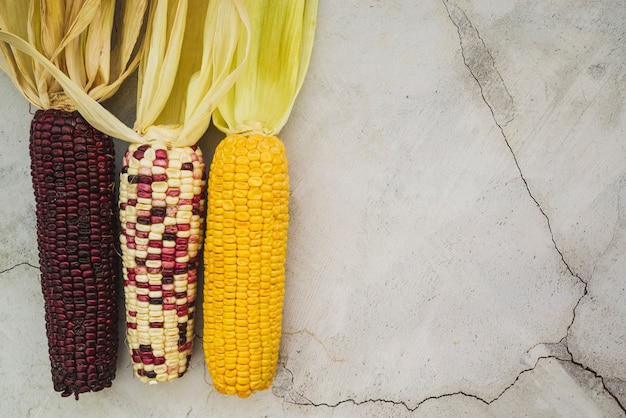
Corn on the Cob: The Ultimate Guide to Perfectly Cooked Ears
Healthy MealsAh, corn on the cob. Just the name evokes images of sunny days, barbecues, and that sweet, juicy flavour that ...

Perfect Pork Roast Oven Cooking Time: A Guide to Delicious Results
Healthy MealsThere's something truly satisfying about a perfectly roasted pork. The aroma alone is enough to make your mout...

Ham Cooking Time: How Long to Bake, Smoke, or Boil a Delicious Ham
Healthy MealsAh, ham. It's a classic, isn't it? A real crowd-pleaser, especially around holidays. And when done right, it'...
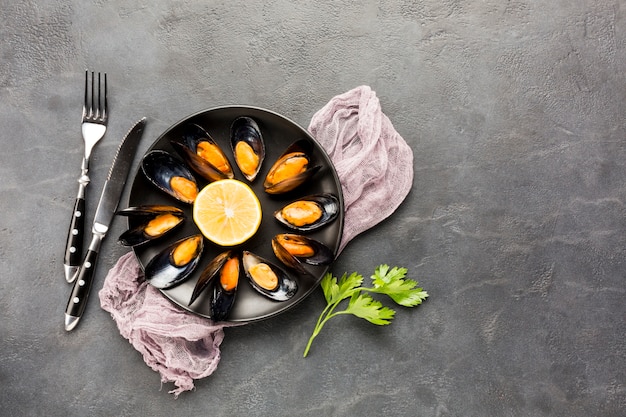
Scallops: The Ultimate Guide to Perfect Cooking
Healthy MealsAh, scallops. Those delicate, sweet, and utterly delicious morsels of the sea. They hold a special place in my...

Spaghetti Squash: The Ultimate Guide to Cooking and Serving
Healthy MealsRemember that time you saw spaghetti squash at the supermarket, looking all bumpy and strange, and thought, "W...
